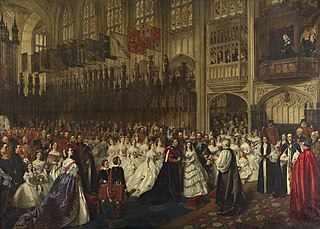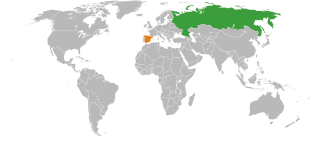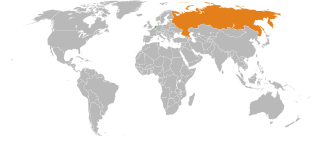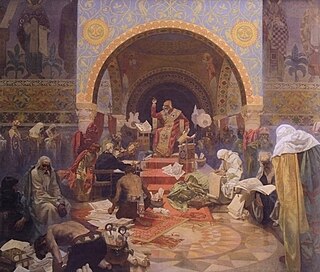
Russia–United Kingdom relations, also Anglo-Russian relations, are the bilateral relations between Russia and the United Kingdom. Formal ties between the courts started in 1553. Russia and Britain became allies against Napoleon in the early-19th century. They were enemies in the Crimean War of the 1850s, and rivals in the Great Game for control of central Asia in the latter half of the 19th century. They allied again in World Wars I and II, although the Russian Revolution of 1917 strained relations. The two countries were at sword's point during the Cold War (1947–1989). Russia's big business tycoons developed strong ties with London financial institutions in the 1990s after the dissolution of the USSR in 1991.

Greek–British relations are foreign relations between Greece and the United Kingdom. Greece and the United Kingdom maintain excellent and cordial bilateral relations and consider each other an ally with the Greek Prime Minister, Kyriakos Mitsotakis, paying an official visit to London in 2021. Greece and the United Kingdom are both members of the United Nations, NATO and the Council of Europe. The United Kingdom is also viewed very favorably in Greece. According to a global opinion poll, 77% of Greeks view the United Kingdom favourably, while only 10% don't. The British have a very positive opinion of Greece as well. 66% of the British view Greece positively, while only 3% view it negatively, making Greece one of the most liked countries in the UK.

The royal descendants of Queen Victoria and of King Christian IX, monarchs of the United Kingdom (1837–1901) and Denmark (1863–1906) respectively, currently occupy the thrones of Belgium, Denmark, Luxembourg, Norway, Spain, Sweden, and the United Kingdom. At the outbreak of the First World War, their grandchildren occupied the thrones of Denmark, Greece, Norway, Germany, Romania, Russia, Spain, and the United Kingdom. For this, Victoria was nicknamed the "grandmother of Europe" while Christian IX was nicknamed the "father-in-law of Europe".

Bulgaria–Russia relations are the diplomatic relations between the countries of Bulgaria and Russia.
Russia–Saudi Arabia relations are the bilateral relations between Russian Federation and Kingdom of Saudi Arabia. The two countries are referred to as the two petroleum superpowers and account for about a quarter of the world's crude oil production between them.

The Russian Federation and the Kingdom of Spain, a member state of the European Union, have bilateral foreign relations. Spain and the Grand Duchy of Moscow first exchanged envoys in 1520s; regular embassies were established in 1722. Soviet-Spanish relations, once terminated after the Spanish Civil War, were gradually reestablished starting in 1963 and were fully established by 1977. Trade between the two countries amounted to two billion euros in 2008. In March 2009, the two countries signed an energy agreement providing national energy companies access to other party's domestic markets.

Netherlands–Russia relations is the relationships between the two countries, the Kingdom of the Netherlands and The Russian Federation. Russia has an embassy in The Hague, and the Netherlands has an embassy in Moscow, a consulate in Saint Petersburg, and an honorary consulate in Yuzhno-Sakhalinsk.

Hungary–Russia relations are the bilateral foreign relations between the two countries, Hungary and Russia. During the Second World War, the Soviet army occupied Hungary, and in 1948 the Soviet Union took full control of the country. It became part of the Warsaw Pact military alliance and the Comecon economic union. Relations between the two countries were damaged in 1956 due to the Soviet military intervention in the revolution occurring in Hungary. Hungary expelled its communist government in 1989, and diplomatic relations with Russia were restored after the breakup of the USSR in 1991.

Denmark–Russia relations are the relations between the two countries of Denmark and Russia. The Kings of Denmark and the Russian Tsars interacted from the 15th century onwards - subsequently Denmark's control of access to and from the Baltic Sea had considerable significance for the trade and naval flexibility of the Russian Empire, while rivalries between Denmark and Sweden on the one hand and between Sweden and Russia on the other led to alliances and military support. Denmark and the USSR established diplomatic relations on 18 June 1924.

The Embassy of Australia in Moscow is the diplomatic mission of Australia to the Russian Federation. The current head of post and Ambassador of Australia to the Russian Federation is Graeme Meehan. The embassy serves as the diplomatic mission for Australia to the Russian Federation, Armenia, Belarus, Kazakhstan, Kyrgyzstan, Tajikistan, Turkmenistan and Uzbekistan. The chancery is located at 10A/2 Podkolokolny Lane in the Tagansky District of Moscow.

Nicholas II or Nikolai II Alexandrovich Romanov, known in the Russian Orthodox Church as Saint Nicholas the Passion-Bearer, was the last Emperor of Russia, King of Congress Poland and Grand Duke of Finland, ruling from 1 November 1894 until his abdication on 15 March 1917. During his reign, Nicholas gave support to the economic and political reforms promoted by his prime ministers, Sergei Witte and Pyotr Stolypin. He advocated modernization based on foreign loans and close ties with France, but resisted giving the new parliament major roles. Ultimately, progress was undermined by Nicholas's commitment to autocratic rule, strong aristocratic opposition and defeats sustained by the Russian military in the Russo-Japanese War and World War I. By March 1917, public support for Nicholas had collapsed and he was forced to abdicate the throne, thereby ending the Romanov dynasty's 304-year rule of Russia (1613–1917).

Tsar, also spelled czar, tzar, or csar, is a title used by East and South Slavic monarchs. The term is derived from the Latin word caesar, which was intended to mean "emperor" in the European medieval sense of the term—a ruler with the same rank as a Roman emperor, holding it by the approval of another emperor or a supreme ecclesiastical official —but was usually considered by western Europeans to be equivalent to "king". It lends its name to a system of government, tsarist autocracy or tsarism.
Andrey Vladimirovich Kelin is a Russian diplomat. He has served in various diplomatic roles since the 1970s, and has been the incumbent Ambassador of Russia to the United Kingdom since November 2019.
Queen Elizabeth II of the United Kingdom of Great Britain and Northern Ireland, her husband Prince Philip, Duke of Edinburgh and Foreign Secretary Douglas Hurd made a state visit to Russia from 17 to 20 October 1994, hosted by the President of Russia, Boris Yeltsin. It was the first and only visit by a reigning British monarch on Russian soil.











